
China is home to almost half the world’s electric vehicles, 85% of the world’s fast chargers and 65% of slow chargers, and leads the world in EV infrastructure. Now it’s innovating on battery swap stations: roll up, swap out the battery, and drive off. Rarely seen globally, they are already thousands of battery swap stations across China.
The International Energy Agency hailed China a “leader in global battery swapping infrastructure.”
IEA
Battery swapping is still rarely seen outside of China because it requires both specialized EVs that support the feature and a network of swapping stations. But it has found a strong foothold in China. By the end of 2023, the total number of battery swapping stations in China reached 3,567, of which 2,333 were operated by Nio.
Battery life and access to charging stations remain the biggest barriers for consumers considering the switch to electric vehicles (EVs) from internal combustion engine. Chinese EV owners queue for well over an hour for a charging station during holidays and then wait another average 50 minutes for the vehicle to charge, according to a 2023 report by the China Electric Vehicle Charging Infrastructure Promotion Alliance (EVCIPA).
The earliest users of battery swap stations in China are Nio owners, who say that the service has already dramatically improved their experiences, especially when traveling longer distances. Now, they simply drive up to battery swap stations and trade their drained batteries for fully charged ones.
Buyers of a Nio vehicle are able to choose to own a battery or subscribe to a battery rental service (BaaS) at 12,720 yuan ($1,760) per year. If the customer chooses to not own a battery, the purchase price of the vehicle could drop by as much as 70,000 yuan ($9,687), with each battery swap only costs 80–100 yuan ($11–$14).
Nio has already formed battery swapping partnership with brands including Geely, Changan, Jianghuai Automobile (JAC), and Chery. The companies announced that they will work together to standardize battery packs across brands, determine battery asset management standards, and roll out other measures to expand the EV battery swap ecosystem.
A failing or damaged battery is one of the top reasons EV owners choose to trade in their car. Experts say that besides shorter charging time, battery swapping could “de-risk” battery obsolescence, allowing users to swap for upgraded batteries as technology advances.
K. Zé Liu, a research analyst at World Resources Institute, pointed out that with the battery swap model, EV owners don’t need to pay for new batteries, which are the most expensive component of a new energy vehicle. “This reduces the cost of cars and is very attractive for commercial fleet companies. They can buy cars in bulk at a lower cost and then lease batteries, which significantly reduces their operating costs,” Liu added.
Other prominent players in the EV sector are joining the battery swapping trend, including battery manufacturer Contemporary Amperex Technology (CATL) and ride-hailing company Didi which announced in January 2024 they are collaborating a new battery swapping venture.
The future of battery swapping is likely to see industry-wide standards . In 2021, China’s Ministry of Industry and Information Technology, published a safety standard for battery swap stations. In June 2023, vice minister Xin Guobin announced that China will develop a universal, cross-brand battery compatibility standard for battery size, connection points, and protocols to facilitate the growth of battery swapping.
While some analysts question the profitability of battery swapping, due to the significant up front costs of establishing swapping stations compared to “traditional” charging stations. Other analysts are more positive. Alexander Li, a battery engineer and co-founder of the U.S. China Climate Forum said that the “growing interest from various EV manufacturers is promising, signaling a potential for industry-wide scalability. The adoption of a universal battery standard is essential for cross-brand compatibility.”
Source: Edited extract from Rest of World, April 3, 2024. https://restofworld.org/2024/ev-battery-swapping-china/